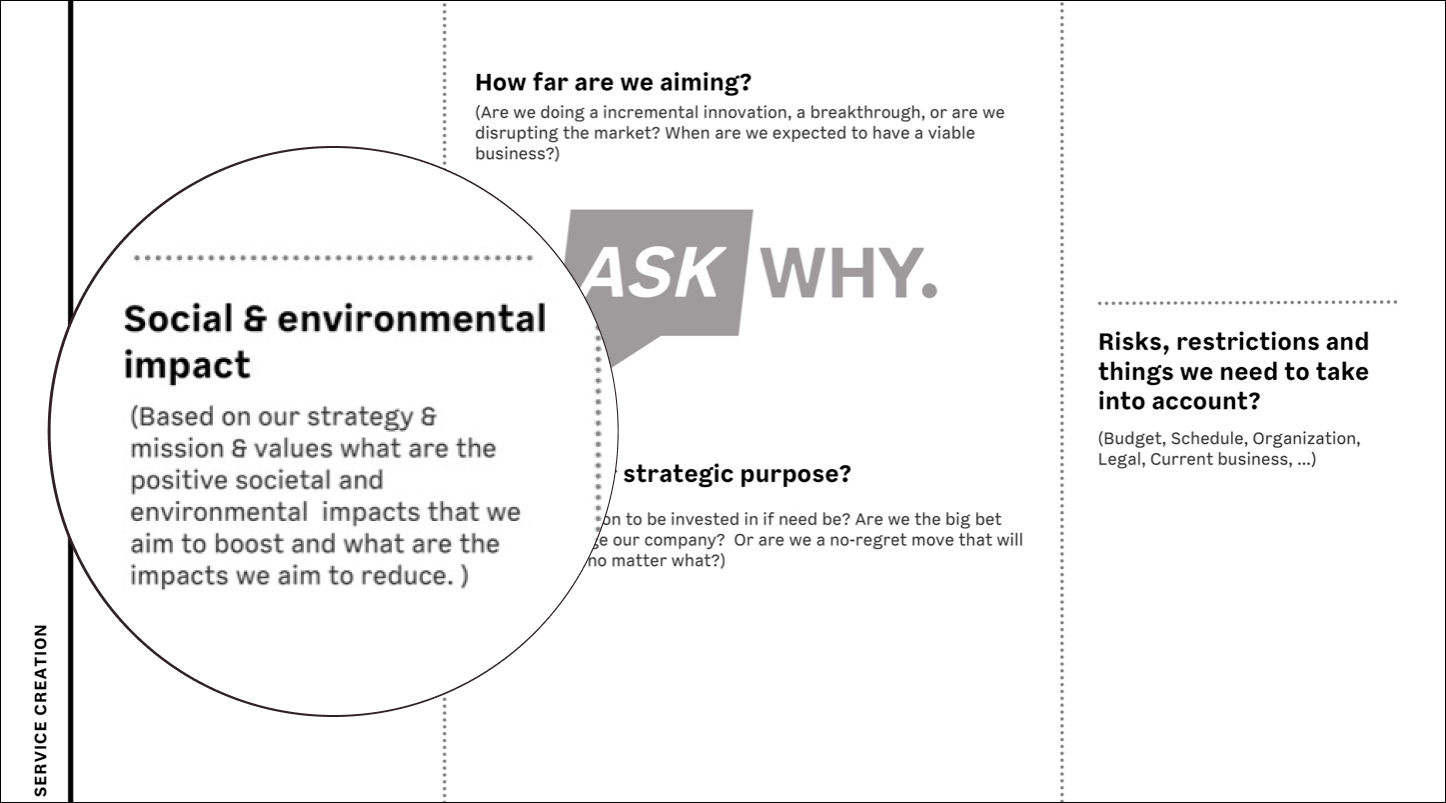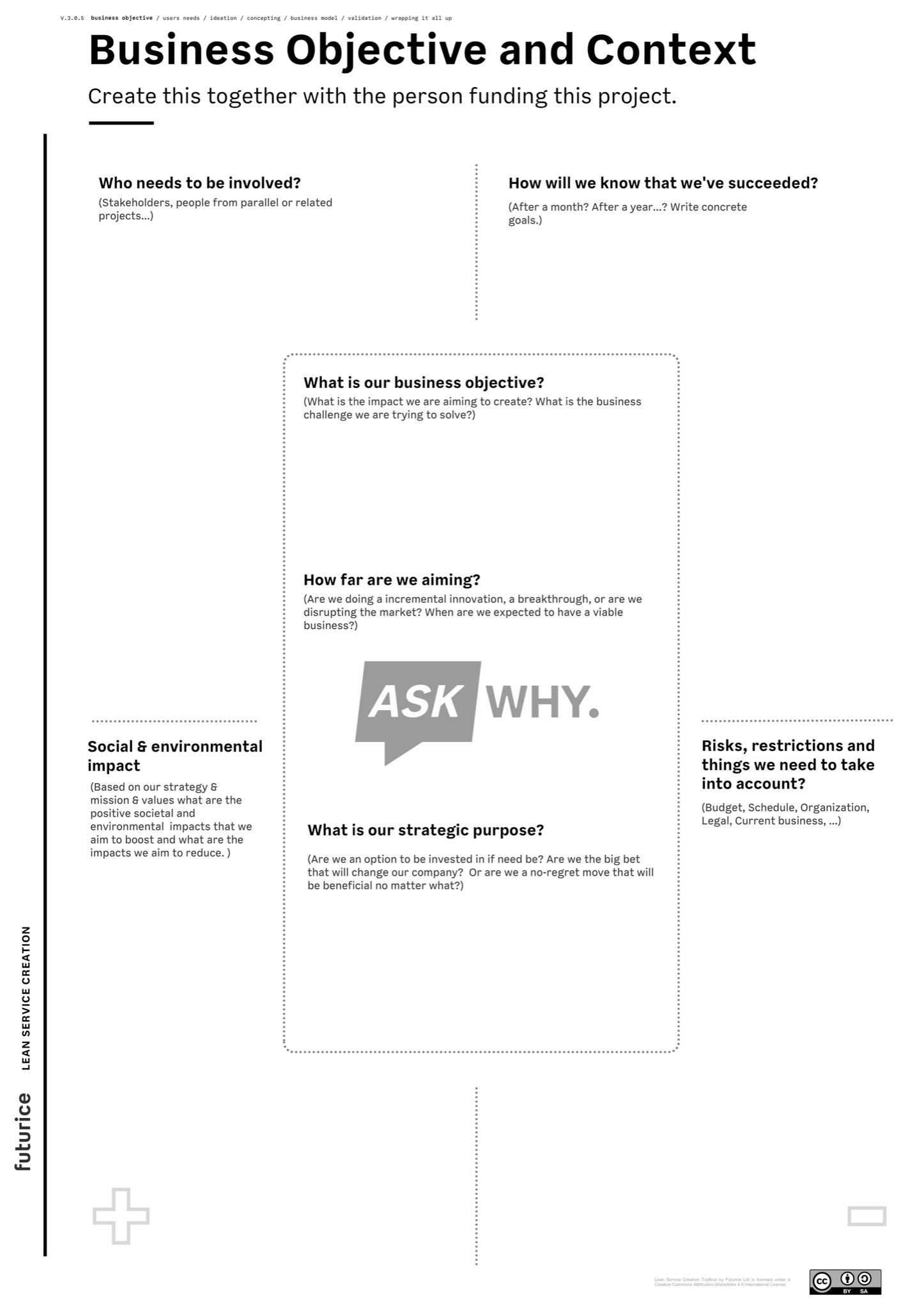Design activism for a better world: every day tools
This is a post about getting used to caring for the climate and society, in every day service creation projects. There is a free canvas set at the end.

H: I’d rather use the older canvases. I don’t like the new ones so much, I think they’re over-complicated.
S: Yeah, I see what you’re saying. The new ones do have a lot more stuff on them. I’ve also struggled with some of the questions.
(...brief awkward silence...)
S: Hey would you mind trying them out anyway with this client? You know how I’m trying to push the impact-on-world angle in all client projects I do nowadays. These canvases are the best way I know how.
H: Well... sure, yeah, why not.
S: Oh that’s great, thanks a lot man!
We did try out the new canvases with the client. We asked the usual questions about the business case, end-customer needs, technical feasibility and then we also got to discuss the societal / environmental angle. Did we save any extra CO2 because of it? Most likely not. Did we make someone’s life better? Again, not really. Did our project’s probable scope even change in any way? Not in this case, no.
Should I still take that as a victory? Absolutely. Well not a glorious victory, just an everyday one.
We talked about climate and society during the kick-off of a rather ordinary software creation project, ordered by the IT department of a rather traditional organization. We got to build an experience with the new canvases. The client’s people got to remind themselves of the bigger meaning of their work. We opened a door for measuring impact later in the project. Most importantly, all of us in the room got one small step closer to seeing this as the new normal: a normal where a new service's impact on the world sits at the same table with business viability and customer experience.
It’s a small win.
Small wins rule
We - designers, technologists, business leaders, entrepreneurs - do need the bigger wins in order to accelerate the paradigm shift towards a regenerative economy. We need the big industrial companies to switch to circular business models; we need more goods-as-a-service and outcome-as-a-service innovations; we need impact start-ups that tackle wicked problems head-on; we need impact accounting in board rooms; we need brave C-level people who are willing to bet on a sustainable future, even when that takes a major transformation from their companies.
The big victories don’t come overnight though and they certainly don’t come by themselves. We also need the smaller victories to get us there: the coffee machine conversations on the footprint of coffee; the understanding of UNSDGs and how they connect to our company’s business; and yes, the service & product creation conversations on the environmental and societal impact of what we are putting into the world.
Even when an enlightened CEO makes the brave bet on putting a company and its ecosystem on a path towards sustainability, there is still a major cultural transformation to be done, before people working with day-to-day tasks will start to talk, think about and most importantly, own sustainability related topics.
The small, everyday wins are often about bringing those aspects into the spotlight. Having the conversations. Asking the questions, on a regular basis. Building the habit and the competence of talking about ethics, impact and the bigger picture.
When putting enough of the smaller wins together, they start adding up to a culture of change. Constraints gradually give way to opportunities. Resistance gradually gives way to excitement. That CEO will have a company that is much better prepared for the challenges and the big wins ahead.
Small wins' tools
Odds are that as we start talking about these questions and looking for those small wins, we’ll hear a voice (most likely inside our head) asking questions like “But is that what we’re paid for? Are we allowed to ask these questions? Shouldn’t we just focus on customer experience? Do we have any budget for this? What if I’m seen as foolish? What if, what if?” Luckily we can circumvent those questions. No need to fight, no need for any awkwardness. Bring on the tools.
Remember the canvases the two not-so-fictional designers were talking about earlier in this post? If you’re insecure about starting that conversation, our canvases will help.

"Lean Service Creation" is a service design methodology we developed and have used successfully for close to 10 years. The newest version of our "LSC" canvases adds an environmental and societal impact dimension, providing us with a natural way to work impact matters into the service creation process.
Get your own copy of the canvases here:
https://hello.futurice.com/lean-service-creation-canvas
We all know the power of defaults. We can use that power to make sure we always have the right conversations during the course of new service creation.
And if this is not the right tool for your needs, find others that fit better. A tool is just a tool after all– what's most important is to get those small everyday wins that will lead us into a new normal.
The LSC canvases are free to modify and use for both commercial and noncommercial purposes, provided the Futurice logo is kept in place (license CC BY 4.0)
Here's an image preview of the first canvas in the set:

 Sebi TauciucLead Designer, Social Responsibility
Sebi TauciucLead Designer, Social Responsibility


